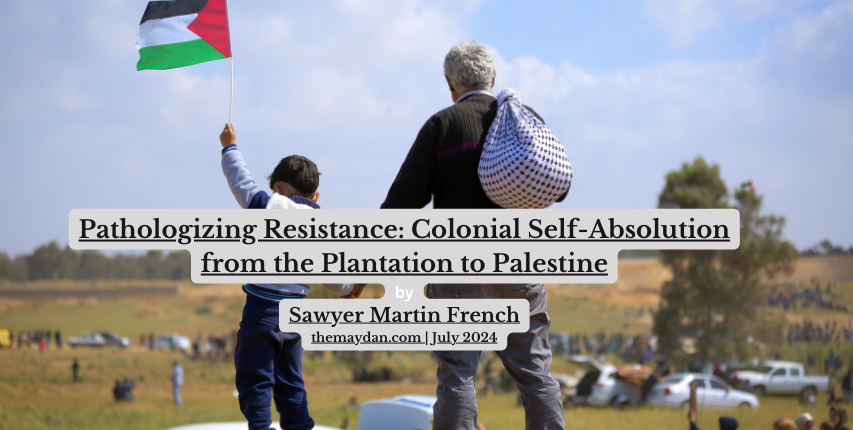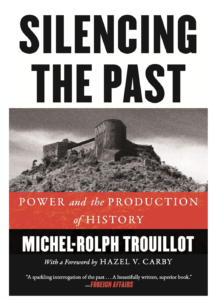
America’s political elite has been busy searching for explanations as to why cities and campuses across the country have erupted in protests over Israel’s recent mass-slaughter of Palestinians in Gaza. As they portray it, this question is shrouded in mystery. In a recent interview with Fox News amid the eruption of pro-Palestine encampments on college campuses, senator Jon Fetterman (D-PA) confessed that he’s “not even sure what they’re really protesting about.”
Of course, the answer to this question is clear to anyone listening to the protesters: they are enraged by the active complicity of their government and institutions in an ongoing genocide. So why have pundits consistently failed to recognize the political critique that protesters articulate?
What’s evident here is a consistent effort to delegitimize the movement by asserting that serious political analysis and action are not the main driving factors behind it. In March, The Atlantic published a piece by a Stanford undergrad arguing that protesters on his campus who truly cared about Palestine “are not the majority.” So if protests are supposedly not motivated by true passion for the causes they espouse, then what’s behind them?
Attempts to explain away Palestine protests as products of underlying psychological factors mirror many past efforts to rhetorically delegitimize acts of resistance against colonial domination.
Elite commentators have offered a range of answers to help explain away the protests as anything but political in motive. Accusations of astroturfing (i.e. the manufactured illusion of grassroot support) abound. In the interview cited above, Fetterman goes on to insist that Jewish anti-zionists groups like Jewish Voice for Peace are not grassroots organizations but rather paid actors. Several university presidents have accused the protests on their campuses of being driven by “outside agitators.”
Among those who do grant the student-led nature of campus protests, many explain them on psychological terms. An NYU business professor suggested that “part of the problem is that young people are not having enough sex, so they go on the hunt for fake threats.” The same student-journalist from Stanford observes, “What really activates the crowds now seems less a principled devotion to Palestine or to pacifism than a desire for collective action, to fit in by embracing the fashionable cause of the moment.” These infantilizing analyses work to reduce the clear messages of protesters to the mere mimicry of an insecure or libidinally-repressed teen seeking to fit in.
In all this commentary on the wave of mass protest over the last six months, we see a refusal to recognize this movement for what it is: a coherent political articulation of resistance to genocide. To acknowledge such a politics would be to entertain its accusations, to entertain the incrimination of the very regime and institutions these elite pundits represent. To repel such accusations, absolving alternatives must be offered instead: the student protester is not a political actor whose demands are to be reckoned with, but rather a psych patient whose ravings are merely symptoms of a deeper personal issue.
It is important to emphasize that this rhetorical tactic has emerged across history as a common elite response to the phenomenon of resistance to colonial violence. American media at this moment now echoes the pontifications of colonial administrators perplexed at the sight of revolt and of planters disturbed by the prevalence of runaway slaves.
Scholar Michel-Rolph Trouillot argued in his 1995 title, Silencing the Past, that the Haitian revolution was “unthinkable” to the white Frenchman of the time, and was thus “trivialized” through the lens of pathology. He describes how planters treated each rebellious slave as an individualized case—“as an animal driven by biological constraints, at best as a pathological case.” Through this discourse of pathologization, resistance was individualized and “drained of its political context” (82). In cases where resistance was undeniably organized and collective, it was chalked up to the corruption of “outside agitators” (92).
 This unthinkability of conscious resistance to slavery manifests among US slave owner discourse as well. In 1851, Dr. Samuel Cartwright offered a theory of “drapetomania,” a mental disorder “that induces the negro to run away from service.” As a solution, he insists that treating the enslaved “like children, with care, kindness, attention and humanity” is sure to cure this neurosis. Through this invocation of psychopathology and individualized treatment, slavery as a system remains conveniently unquestioned.
This unthinkability of conscious resistance to slavery manifests among US slave owner discourse as well. In 1851, Dr. Samuel Cartwright offered a theory of “drapetomania,” a mental disorder “that induces the negro to run away from service.” As a solution, he insists that treating the enslaved “like children, with care, kindness, attention and humanity” is sure to cure this neurosis. Through this invocation of psychopathology and individualized treatment, slavery as a system remains conveniently unquestioned.
Aimé Césaire, writing on French reactions to Madagascan revolt, emphasizes a similar evasive self-absolution. He highlights psychoanalytic explanations of this resistance as “purely neurotic behavior, a collective madness, a running amok” (61). As a result, Césaire emphasizes, the Madagascans are seen not as “setting out to conquer real objectives but an ‘imaginary security,’ which obviously implies that the oppression of which they complain is an imaginary oppression” (61). Recall the parallel accusations leveled against pro-Palestine protesters—they seek social belonging, not real political objectives.
In Southeast Asia, colonizers offered similar invocations of psychopathology in the face of resistance. Colonial psychiatrists in the Dutch East Indies developed theories of the “native mind,” which was seen to be prone to instability and sudden outbreaks of murderous violence, a pathology glossed with the Malay term “running amok.” Acts of violent resistance against colonists were taken as manifestations of this pathology, never as signs of a broader anti-colonial consciousness.
However, as historians have shown, the term “amok”—before its individualized psychiatric appropriation by colonial scholars—had served as an indigenous rallying cry for collective, organized resistance. Here we see a neat distillation of colonial discourse pathologizing rebellious politics and locating its cause within the neurotic colonial subject, rather than in conscious opposition to the violence of the colonial regime.
Syed Hussein Alatas traces a similar genealogy behind discourses about the “lazy native” in colonial Malaya. “It was the unwillingness to become a tool in the production system of colonial capitalism which earned the Malays a reputation of being indolent” (72). Rather than entertain this indigenous critique of and resistance to the ascendant imperialist order, colonists smugly assured themselves that the problem lay in the racially characteristic indolence of the natives, rather than in the brutality of the plantations and mines they oversaw. The colonial eye registers only pathology, never resistance.
What is at stake here are the thoughts that the political elite are unable—or unwilling—to entertain. As Trouillot writes, “To acknowledge resistance as a mass phenomenon is to acknowledge the possibility that something is wrong with the system” (83). Such an acknowledgement is impossible for pundits and politicians who serve that very system.
All these examples demonstrate that this sudden storm of media obfuscation about the psychological motives behind pro-Palestine protests is not a novel tactic, but rather the recycling of a worn-out colonial trope. Listen to the psychologists: maroons must be suffering from drapetomania; student protesters must be sex-deprived. Because what could they possibly have to rationally oppose?
On the consciousness of the imperialist bourgeoisie, Césaire writes: “his brain functions after the fashion of certain elementary types of digestive systems. It filters. And the filter lets through only what can nourish the thick skin of the bourgeois’s dear conscience” (52). When faced with the violence of colonialism and the facts of resistance against it, his consciousness has only one resort: “Start the forgetting machine!”
The examples discussed above highlight one common way in which this “forgetting machine” functions to filter out any ugly truths that might incriminate the colonist himself. If one filters all acts of resistance through the lens of individualized pathology, then no blame falls through onto the project of colonialism itself. It is crucial that we see this discourse for what it is, that we refuse to let the colonizer wriggle out of our critical sights with these self-absolving delusions, that we keep our eyes on Gaza and bear witness to the ongoing violence of colonialism.
Sawyer Martin French (@WharfScenery) is a lecturer at Sunan Kalijaga University in Yogyakarta, Indonesia and co-manages The Suryakanta, an Indonesian forum for reviews of academic books.

